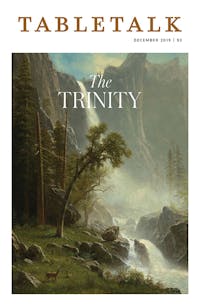
Request your free, three-month trial to Tabletalk magazine. You’ll receive the print issue monthly and gain immediate digital access to decades of archives. This trial is risk-free. No credit card required.
Try Tabletalk NowAlready receive Tabletalk magazine every month?
Verify your email address to gain unlimited access.
It is becoming increasingly popular for people to speak in terms of their version of truth. They use phrases such as “my truth” and “your truth,” as if there are different versions of truth. I have heard people speak of “my truth” in reference to all sorts of things, including history, ethics, science, and religion. While we are certainly entitled to hold our own opinions, we are not entitled to hold to our own versions of truth, for it is impossible for more than one version of the truth to exist.
This way of thinking is not merely the relativism of the past or postmodern pluralism or religious syncretism. This new way of thinking embodies conceptualism. The philosophical mind-set of conceptualism has emerged as a necessary consequence of the post-postmodern zeitgeist (the spirit of the age) as a way for us to engage with other people with whom we disagree and yet get along. Conceptualism provides people with a way to create their own personally conceived realities of truth so that they can believe whatever they want to believe and deny whatever they choose to deny in accordance with their own concept of truth—even if their own conceived reality has no basis in what is in fact reality. Now people can have their own self-conceptualized realities in which they claim to possess their truth while others (with whom they disagree) possess their own truth, with neither truth being true for all people. All this is done so that they can get along in their shared environment of the classroom, the workplace, the internet, and the church.
While conceptualism is manifesting itself in devastating ways in the world, it is proving to be downright deadly in the church. We see this way of thinking most abundantly in the way people speak of God. It has become common for people to speak of “my God” and “your God,” saying things in defense of their view of who their God is and what their God would do or couldn’t do, such as “My God isn’t a God of wrath; my God is only a God of love.” Or “My God wouldn’t do that. . . . Your God might, but not my God.” But since we are not entitled to our own versions of the truth, we are not entitled to our own versions of God. We are not entitled to our own version of what God does or who God is. We are to follow the one true God, who is Father, Son, and Holy Spirit, and so if we are to know and worship this God, and not the God of our own making, we must know about our triune God. We must know what we affirm and what we deny about who God is. For there is one triune God, and we cannot create Him in our image or according to our own conceptualized reality of who we think He should be. There is one God, and we are not Him, and there is no other.
